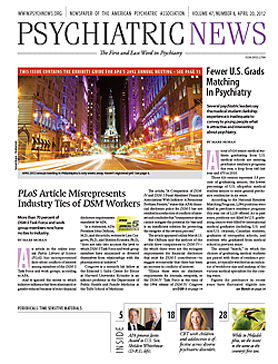The Food and Drug Administration (FDA) has issued a draft guidance defining the criteria for manufacturers to voluntarily notify the agency of any issues that may result in a drug shortage or supply disruption. Legally, manufacturers are required to report problems only for single-source drugs that are medically important. The agency said it will also consider temporary importation of unapproved foreign drugs as an option “in rare cases.”
The draft guidance comes a few months after President Obama issued an Executive Order instructing the Department of Health and Human Services to resolve critical shortages.
Although pediatric cancer drugs have been in the media spotlight, drug shortages are a widespread problem that affect psychiatry as well.
“Since we started collecting and tracking these data, 2011 was the worst year ever with 276 new shortages,” Bona Benjamin, director of medication-use quality improvement at the American Society of Health-System Pharmacists (ASHP), told Psychiatric News. ASHP maintains an online drug shortage bulletin in collaboration with the University of Utah Drug Information Service and Novation, LLC.
The FDA also posts a drug shortage list, which is shorter than the ASHP list. Benjamin said the organization receives and posts reports from pharmacists all over the country.
Psychiatric drugs on the current shortage list include amphetamine mixed salts (immediate-release tablets and extended-release capsules), buprenorphine injection, diazepam injection, haloperidol lactate and decanoate injections, ketamine injection, lorazepam injection, naltrexone oral tablets, trazodone tablets, and valproate sodium injection (Psychiatric News, February 3).
The problem is not going away. “The drug supply chain is an extremely complex system with many parts,” Benjamin said. From the manufacturer to the patient, the supply chain has many links that could break. Every shortage has a slightly different roadmap of causes.
Shortages occur when a drug product is manufactured by only one or two companies, a company shuts down the production line for business reasons, the FDA shuts down a plant for substandard conditions, raw material is not available, the demand for the drug rises unexpectedly, or some of these events occur together.
Injectable generic drugs are the most common items on the shortage list, because injectable drugs require a higher manufacturing standard, and generic drug makers run on a very thin profit margin. A small generic drug company may lack the capacity to recover quickly from a failed inspection or scale up production in response to an increased demand.
For example, the prolonged shortages of methylphenidate and amphetamine mixed salts are partially linked to raw material restrictions placed by the Drug Enforcement Agency (DEA), according to Benjamin. The DEA sets an annual quota on raw materials for controlled substances, and each manufacturer has its own cap. If one manufacturer cannot use up its quota in that year for any reason, the unused portion cannot be transferred easily to another manufacturer to make up the difference in output. In 2011, Teva reported that it could not increase its production of generic amphetamine salts in response to the shortage because of the DEA quota.
Even though many unavailable drugs are not critical or result in life-threatening situations, the unpredictability and growing frequency of shortages are frustrating health care professionals and taxing a health care system that is already stretched thin. Physicians and pharmacists have to scramble constantly to find substitute treatments without compromising patient health. As most shortages involve generic drugs, hospitals are forced to purchase brand-name products, alternative drugs, or the same drug with different unit sizes, sometimes at many times the cost of the generic.
“We have received anecdotes of patient harm from drug shortages,” said Benjamin. Even if a patient’s physical health is not affected, the emotional distress is often unavoidable.
Given the complexity and scale of the problem, there is no expectation of finding a “sweeping solution” to prevent drug shortages, said Benjamin.

